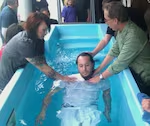Michael Ray Townsend was a musician. Not the type of musician who occasionally picks up the guitar and strums out a few basic chords. He played the violin, the piano and the drums.
“He could even play the seven-string guitar. He played guitar behind his back,” said his younger sister, Rachel Steven. “He started playing the violin at a very young age. Our uncle is a pastor and he played the violin. So my brother, from a very young age, had violin lessons.”

Michael Ray Townsend at his baptism about ten years ago in Bakersfield, California.
Courtesy of the family / Courtesy of the family
Townsend was shot and killed by Portland police officer Curtis Brown last Thursday during what the bureau said was a welfare check. Multiple people familiar with the circumstances around the shooting confirmed to OPB that Townsend made the phone call himself, seeking help for his suicidal ideations. He also told first responders he had a weapon before police arrived, the sources said.
Security camera footage released by the Portland Police Bureau on Friday shows Townsend sitting on the stairs outside a Motel 6 in Northeast Portland, talking to two police officers and four paramedics and firefighters. In the first half of the video, the situation appears calm, but then the first responders quickly move away from Townsend and Brown draws his firearm. Townsend stands up from the stairs and is seen advancing toward Brown, appearing to hold a weapon in his hands before Brown shoots him.

Security camera footage shows police officers and firefighter paramedics talking to Michael Ray Townsend moments before being shot and killed by Portland police officer Curtis Brown.
Courtesy of the Portland Police
Townsend’s sister, herself a mental health advocate, told OPB her brother lived with unaddressed mental health needs for years before police killed him. His death fits a familiar pattern in Portland, where police are under a settlement agreement with the U.S. Department of Justice for using excessive, and sometimes deadly, force against people living with mental health needs.
One of Steven’s fondest memories of her older brother was when he was a freshman in high school and he went through a phase where he was obsessed with John Lennon and the Beatles.
“I think my happiest memories would be us playing music together,” Steven recalled. “We would write songs together, he would play guitar, and for hours we would just talk and listen to music,” Steven said.
Townsend was also a deeply religious man, according to his sister, who said they grew up in the church. Police released Townsend’s mug shot after his death, showing a man with tattoos on his face. Steven said that while the tattoos may make her brother look scary, his sense of empathy and compassion was boundless.
“If he was starving, he would still give somebody his food or his money or water or anything to help somebody else,” Steven said.
In the early 2000s, Townsend was diagnosed with bipolar depression and schizophrenia. Steven said right up until June 24, the day he was killed by a Portland police officer, her brother struggled to get help for his mental health.
Townsend was born in Hawaii before his family moved to Bakersfield, California, an agricultural hub in California’s central valley. After his diagnosis, Townsend spent a few years in a psychiatric facility in California, but he said the other residents made it difficult for him to feel comfortable.
“It was difficult because a lot of people that are in mental institutes, they have done crimes against children and things like that,” Steven said. “I think at that point, Mike was probably a lot more functioning than them. It made it very difficult for him just to get along with the other patients. Because a lot of them had violent episodes and things like that.”
After Steven moved from Bakersfield back to Hawaii where they were born, Townsend moved north to Portland, where the city’s reputation as an open and accepting place called to him. Townsend, who was half Korean and a heavily tattooed artist, didn’t always feel at home in more conservative Bakersfield.
Still, Steven said her brother struggled in Portland, too. Steven said mental health care was more difficult to access than in California. Townsend was registered with the state of California as being permanently disabled, according to her, which came with social services like counseling and medication management.

Rachel Steven with her older brother, Michael Ray Townsend.
Courtesy of the family
In Oregon, things were more challenging, Steven said. Instead of getting help, Townsend wound up in and out of jail, where his mental health deteriorated further.
“Just this last time he got out, he said how bad it was in jail,” Steven said. “I don’t think he was even able to access his psychiatric meds while in prison. And I know that he needed help while in prison, and he was not getting it. He had multiple panic attacks while in jail.”
After struggling in jail, Steven thinks Townsend, who was on probation, was terrified of going back. She said she thinks his fear may have been a factor in his suicidal thoughts.
The Portland Police Bureau’s track record of dealing with people in mental health crises is what led the U.S. Department of Justice to sue the city in 2012. That ultimately led to the DOJ settlement agreement, which is still in place and governs much of the city’s use of force policies.
The city fell out of compliance with the settlement agreement last year as a result of thousands of uninvestigated use of force incidents during last summer’s racial justice protests.
Steven watched the security camera footage released by Portland police on Friday, and isn’t surprised her brother became agitated.
“I know they tried to deescalate the situation and I appreciate anyone who tried to help intervene,” Steven said. “We’re just way beyond that. Feeling suicidal and being surrounded by so many people has got to be scary. I would be scared if I was surrounded by police. I would be terrified.”


